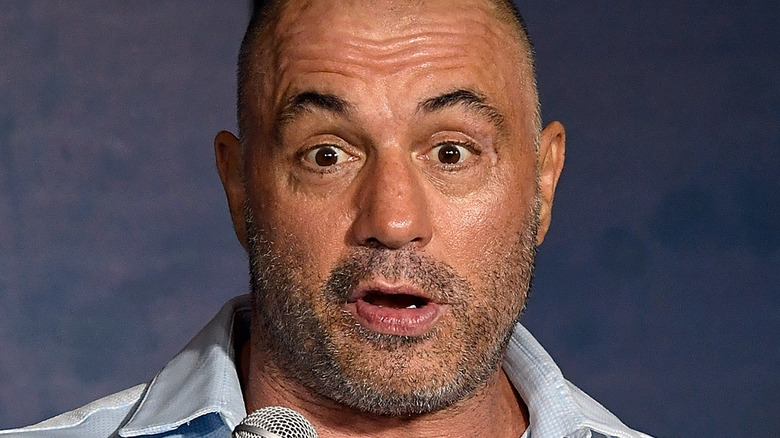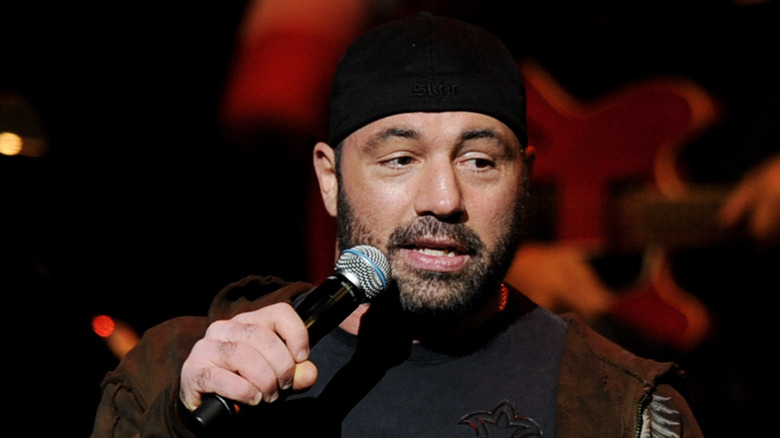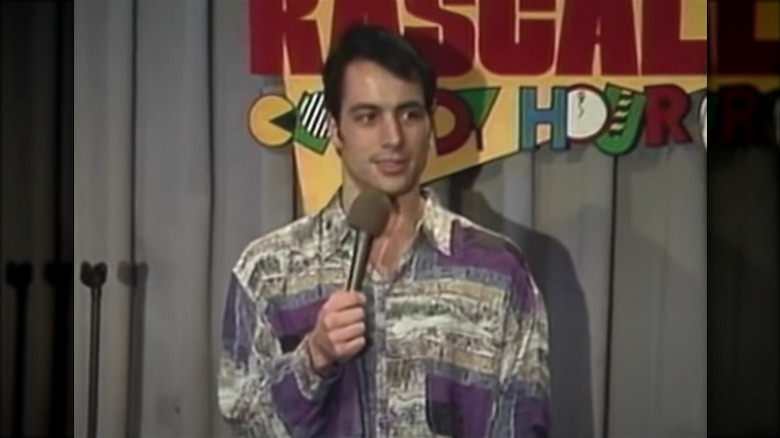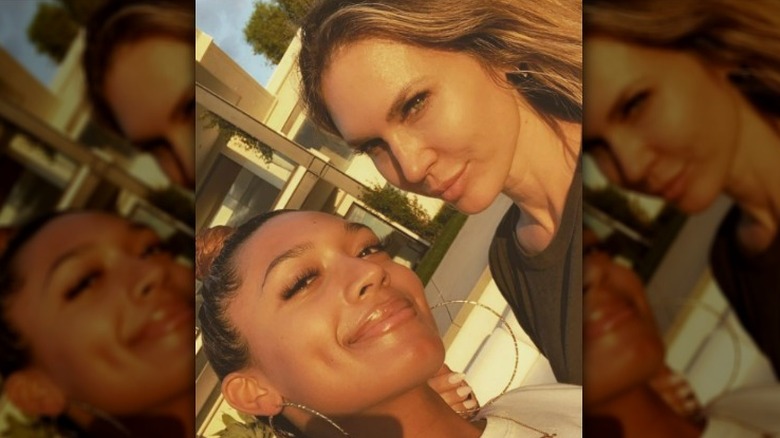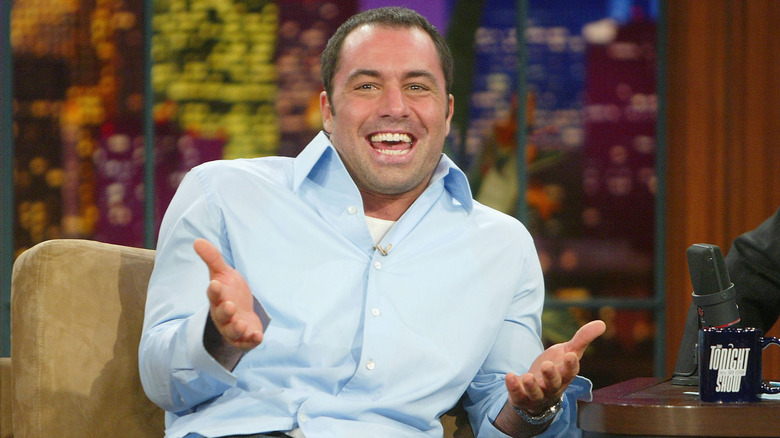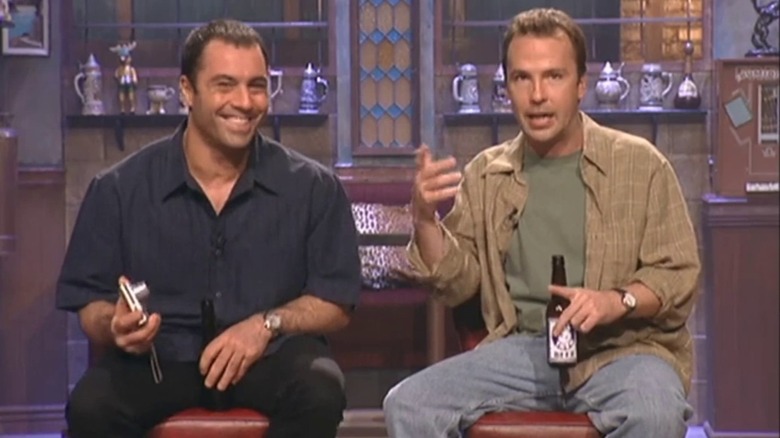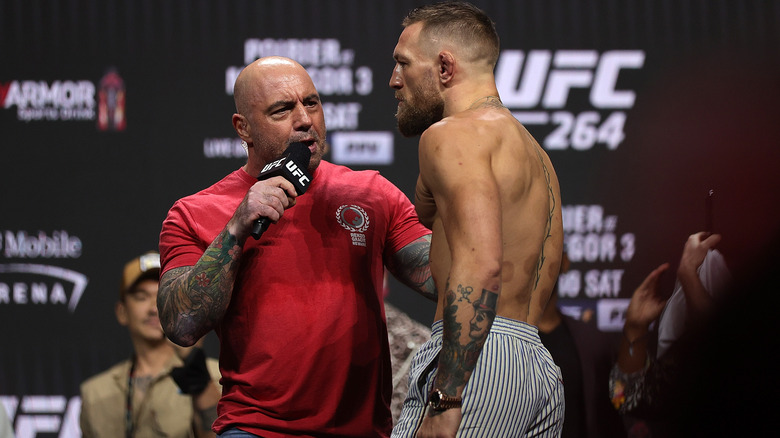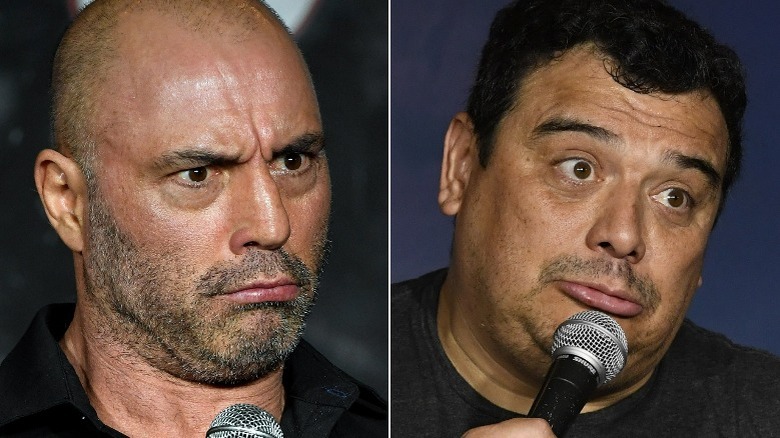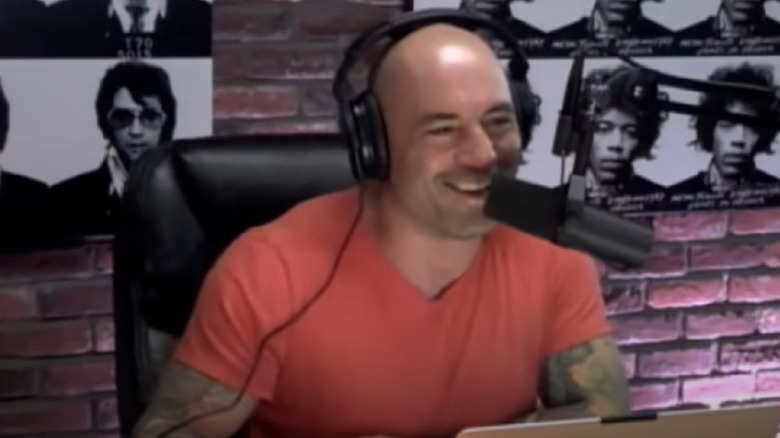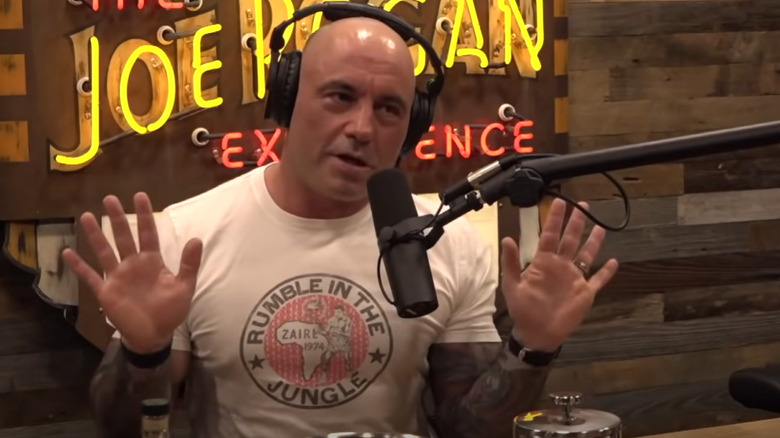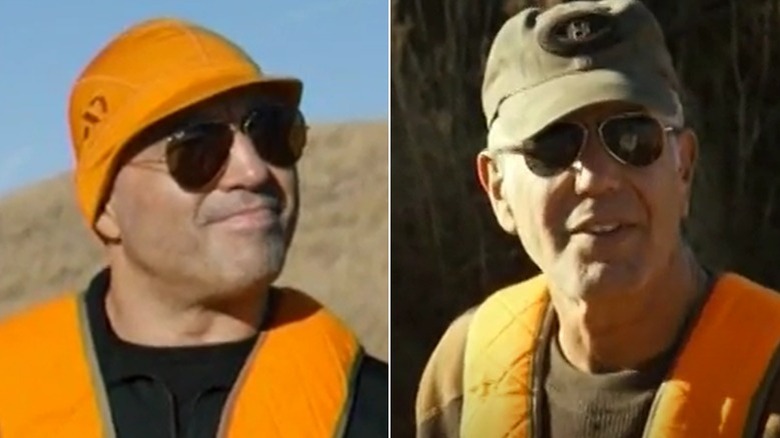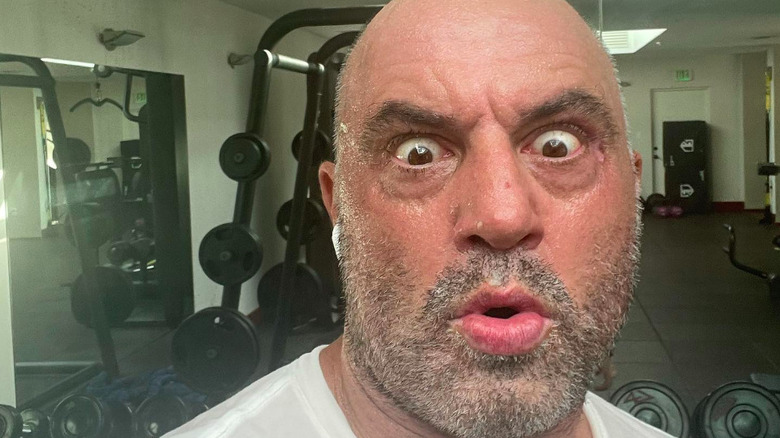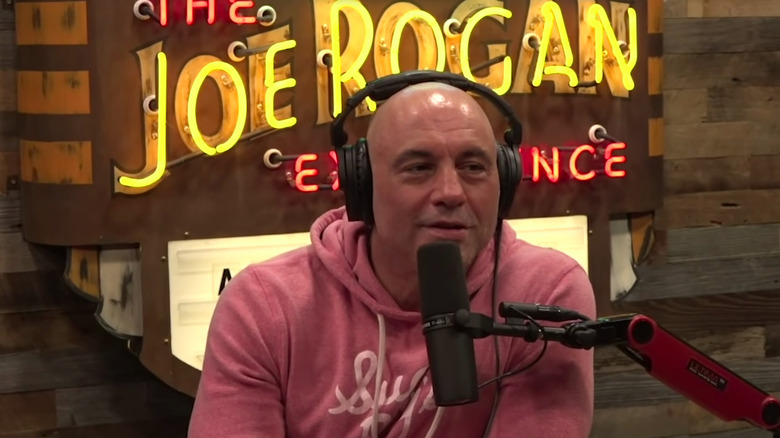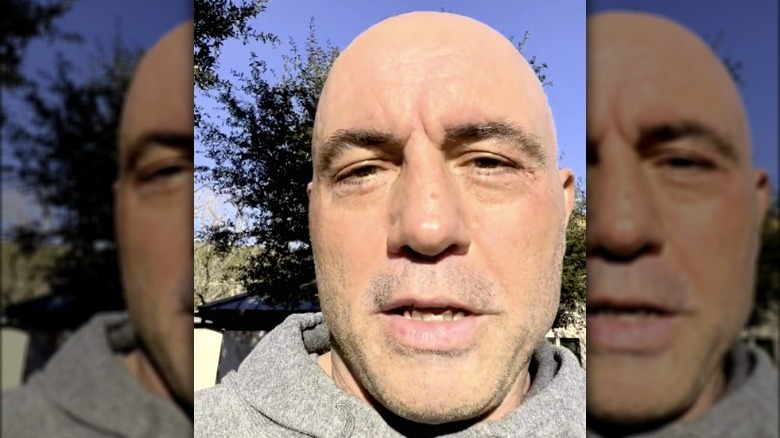What You Never Knew About Joe Rogan
The first few months of 2022 were dramatic. Between Kim Kardashian and Kanye West's divorce, Whoopi Goldberg's temporary ouster from "The View," the continuing COVID-19 pandemic, and, oh yeah, the whole Russia-Ukraine thing, there was no shortage of fodder for water cooler conversations.
And yet, one of the most talked-about people in the first quarter of the year was a UFC commentator and stand-up comedian: Joe Rogan. The entertainer has been ruffling feathers since he hit the stand-up scene in the early 1990s. His podcast, "The Joe Rogan Experience," is a monster hit that earned Rogan an estimated $200 million deal with streaming giant Spotify, per The New York Times.
But scooping up a gigantic public paycheck is a great way to bring critics out of the woodwork. Since he scored his banner podcast deal, people have pointed out some of Rogan's unsavory comments and moments — not to mention the fact that he's had conspiracy theorist and Sandy Hook "truther" Alex Jones on his show. The debate around Rogan feels so uniquely 2022, it's easy to forget he's been a public figure for nearly 30 years.
He hasn't spoken to his dad since childhood
Joe Rogan may be the de facto face of the UFC now, but there was a time when he was just a little kid bouncing from state to state as his mom moved around the country. "He comes from a home busted up by violence in Newark, New Jersey," according to Rolling Stone. His biological dad worked as a police officer, but his parents got divorced when he was 5. He moved to San Francisco with his mom and her new husband soon after that. "Never heard from him again," Rogan said of his father.
His father was violent towards both Rogan and his mother, he revealed, but "I don't hate the guy," he told Rolling Stone. "I don't want to beat his a**. I just don't want to be involved with him, and I don't want to talk to him. He was very nice to me, loved me. But he was super, super-violent, and he would have turned me into a f***ing psychopath."
Rogan would later move to Boston with his mother and stepfather as a teen, per The New York Times. Luckily, he liked his step-father. "He's a great guy," he said on a 2017 episode of his podcast. "Super lucky. He's a real good guy."
Joe Rogan started doing stand-up comedy in Boston in the 1980s
Although Joe Rogan may be best known for his podcast, his UFC commentating gig, or his past TV shows, he's been doing stand-up comedy longer than any of those jobs. Rogan first tried stand-up in 1988 when his friends goaded him into it at a comedy club in Boston, per The New York Times.
"I got talked into doing stand-up by my friends from martial arts," he said on a 2017 episode of his podcast. "We would go to compete ... and I would be the guy who would make everybody laugh because everybody was so nervous." He added, "I was just trying to lighten up the mood. And that's how I got into stand-up."
He quickly rose through the ranks and even appeared on MTV's "Half Hour Comedy Hour" in 1994. Since the early 2000s, he's recorded a total of six comedy specials, per his website. His most recent comedy special, "Strange Times," was released on Netflix in 2018.
He's married with two daughters and a stepdaughter
Joe Rogan is more of a family man than some people might think. He married former cocktail waitress Jessica Rogan in the 2000s, per The New York Times, and helped raise her daughter from a previous relationship. The couple had two more daughters, and Rogan says it changed his life. "Everybody who knows me says there's, like, me pre-children and post-children," he once said on his podcast. "I'm so much nicer."
Although Rogan refrains from posting photos of his wife or daughters on social media, his stepdaughter, musician Kayja Rose, sometimes posts pics with her mom. And despite being largely tight-lipped about his personal life, Rogan has spoken at length about parenthood. In an appearance on "The Rosie Show," he called Kayja "an awesome kid" and told host Rosie O'Donnell that their father-daughter bond is so strong that Kayja would talk to him about "weird" and "uncomfortable" topics — including boys — as a teenager.
"You have this very insane connection with them," he said of his kids in a 2017 episode of his podcast. "It gives you this weird empathy for all the rest of the people in the world because all of a sudden they start to look like children. Everyone to me is a child that became an adult."
Networks like MTV and Disney fought over him in the 1990s
After Joe Rogan snagged a spot on MTV's "Half Hour Comedy Hour," MTV offered him an exclusive, three-year deal for just $500, he told Shecky magazine, a publication about stand-up comedy. His manager tried to start a bidding war based on this paltry offer, and it worked."Well, network folks, being the sheep that they are, immediately reacted and started a bidding war for me," Rogan recalled. "I got a pile of cash and wound up on a Fox sitcom that Disney produced."
That sitcom was "Hardball," which only lasted six episodes. He moved on to the successful sitcom "NewsRadio," starring Phil Hartman, next. Despite being best known as an actor throughout the '90s, he openly confessed that he was only in it for the money. "Acting is just a part-time job for me that allows me to buy expensive s***," he told Shecky. "If I could make the same amount of money doing stand-up, it would be no contest."
He'd later make even more money from TV when he became the host of "Fear Factor," a game show that saw him coaxing contestants into lying in pits of vermin and eating worms for a shot at $50,000. He hosted the show from 2001 through 2006 and returned for a revamp in 2011. The show averaged 11.5 million viewers, per Reuters, hinting at the mass appeal that Rogan's podcast would eventually have.
The comic fought with Comedy Central over the fate of The Man Show
After Joe Rogan shot to fame on "Fear Factor," he became a co-host of the cult Comedy Central hit "The Man Show" along with friend Doug Stanhope. "Fear Factor has made me famous, and that has allowed me to do 'The Man Show,'" he told Men's Fitness in 2003. "'The Man Show' is far funnier than 'Fear Factor,' and it will allow people to see me as a comedian."
But it wasn't all smooth sailing. A Herald News reporter caught him yelling at the show's executive producer for coming in without knocking, although Rogan insisted it was "all fake anger."
Years later, in 2009, his comments to Vanity Fair proved that the anger mightn't have been so fake after all: he called hosting the series "god-awful and terrible." He thought he'd have free rein on the show but said, "Once we got there, they had scripts and a very specific idea of the show's direction. The percentage of bits that Doug [Stanhope] and I got on the air that we actually wanted to do, it was maybe 5%." He would only last one season on the show, which was canceled in response to a sizeable viewer exodus, per The Futon Critic.
Joe Rogan got into martial arts due to a fear of being beat up
Joe Rogan moved around a lot as a kid and wasn't very tall, so a fear of being clobbered by bigger kids dogged him. Because of this, he decided to learn the formal art of fighting. "I was scared of this one kid so bad," he said on a 2018 episode of "The Joe Rogan Experience." "I do remember him getting me in a headlock, throwing me on the ground, and then leaning like he was gonna punch me in the face but deciding not to." He didn't know how to respond, he said, and he started karate lessons soon after.
Later, his love for mixed martial arts would have a massive impact on his career. Between stints on "Fear Factor," Rogan became a UFC commentator on a whim. He told UFC president Dana White he didn't want the job at first because "I just want to go to the fights and drink," per Rolling Stone. White offered him free tickets as payment for his commentary, and before long, he was the face of the UFC.
"He's educated more people in mixed martial arts than anybody ever," White told Rolling Stone of Rogan. "He's the best fight announcer who has ever called a fight in the history of fighting."
He helped cancel Carlos Mencia for joke stealing in the 2000s
Anyone who's listened to an episode of Joe Rogan's podcast can tell you he's no fan of cancel culture. But ironically, Rogan himself "carried off perhaps the first celebrity cancellation of the modern internet age," per The New York Times.
Carlos Mencia was one of comedy's rising stars in 2007 when Rogan confronted him onstage at the Comedy Store and accused him of stealing jokes from other comics, per Rolling Stone. A friend recorded the fight, and it went viral. This bolstered Rogan's career and tanked Mencia's. "For the majority of comedians, he was looked at — still is — as a kind of hero to the cause," Mencia told The New York Times in 2021. "It is ironic that a guy who is now saying you shouldn't cancel anybody at least started the building of his podcast by canceling me."
Still, Rogan says he no longer has any beef with Mencia. "I don't have any hate for that dude," he said on his podcast, according to The Hollywood Reporter. "And I hope he's doing great, I really do."
His podcast entered iTunes' Top 100 after just a year
Joe Rogan started his podcast, "The Joe Rogan Experience," in 2009. It hit the top 100 on Apple Podcasts only a year into its existence, according to Entertainment Close-Up. In 2015, the show had a reported 16 million downloads per month, according to Rolling Stone, after five years of recording. By 2019, that number had allegedly risen to 190 million, per The New York Times. Today's numbers aren't public.
Rogan's guests have included, per Rolling Stone, "believers in the sanctity of shrooms, four-hour-work-week proselytizers, rappers, former LAPD cops, outdoorsmen, futurists, neuroscientists, Egyptologists," and the list goes on and on. He says the diverse guest roster has made him a well-rounded person. "If I had lived my life without doing this podcast," he said on a 2019 episode of the show, "I would probably be a far more ignorant person right now, in the same place."
Joe Rogan doesn't employ a fact-checker on his podcast
Although "The Joe Rogan Experience" covers a lot of ground, some of it controversial, its host has shied away from hiring a fact-checker. Some of his podcast episodes have featured misinformation and inaccuracies, such as when he claimed "left-wing people" were "lighting these forest fires" in Oregon, per The Washington Post. He later admitted in a tweet that he was wrong and "very irresponsible [for] not looking into it."
He decided to fact-check controversial guest Alex Jones during an episode in 2020 but claimed on Instagram that "every single crazy thing" Jones said was verified. However, publications including The Verge and BBC argued that this wasn't the case at all and that Jones had been free to spread misinformation. Speaking to BBC, Imran Ahmed, the chief executive of the Center for Countering Digital Hate, called Jones' comments "really really dangerous" and added, "I don't think Joe Rogan knows what a fact-check is."
Rogan's defense is that listeners should take everything on the show with a grain of salt. "If you say you disagree with me, I probably disagree with me too," he has said, per The New York Times. "I disagree with me all the time."
The comedian appeared on an episode of Anthony Bourdain's show
Joe Rogan and TV star Anthony Bourdain guested on each other's shows before Bourdain's death in 2018. Their public friendship goes all the way back to 2011, when Bourdain appeared on Rogan's podcast to talk about everything from his favorite countries to the difference between public speaking and stand-up comedy.
Rogan reciprocated by appearing on Bourdain's CNN show, "Parts Unknown," in 2016. He showed Bourdain how to shoot wildlife for food. When Bourdain declined to identify as a hunter, Rogan quipped, "We hunted all day. You take a s***, you're a s***ter."
After Bourdain died by suicide, Rogan remembered him in a podcast episode. "He was a friend of mine," he said. "What was really weird was he'd been saying really recently that he'd never been happier." The pals also had a passion for martial arts in common. "He was addicted to jiu-jitsu," Rogan said.
He once ate little more than meat and eggs for a whole month
Joe Rogan has long been a fan of meat-eating, even hunting his own game. He once showed a Rolling Stone writer his garage freezer, which was filled with bits of moose, wild pig, deer, and bear — all hunted by Rogan himself. "Yes, I get some grief for it," he said, referring to animal-rights activists' criticism of his food habits.
His passion for the meat-eating arts is evidenced by the endless photos of meat on his Instagram. And he took it even further when he went a month eating nothing but grass-fed beef, elk, and bacon.
"You don't crash," he said of his energy levels during his month without fruits, vegetables, grains, or anything but meat. "I took a bunch of different vitamins and nutrients and supplements on top of this carnivore diet, so I'm only eating meat." So if the diet was so wonderful, why did he quit? "Explosive diarrhea," or as he also put it, "two weeks of rocket fuel coming out of your booty hole."
His Spotify deal put him under a microscope like never before
Joe Rogan's podcast used to be one of the largest independent platforms in the land — until Spotify scooped it up for a cool $100 million to $200 million, depending on who you believe. The Wall Street Journal broke the news that Spotify was paying Rogan $100 million in May 2020, leading to an outcry from fans who worried this would lead to corporate censorship.
"It will be the exact same show," Rogan reassured his listeners, per The New York Times. "I am not going to be an employee of Spotify."
Nearly two years later, The New York Times dished that Rogan had actually made double what was originally reported. For Spotify, the show takes the number-one slot in 92 international markets as well as the U.S., and the company is reportedly happy with the growth in ad sales that accompanied its purchase of "The Joe Rogan Experience." The controversy that accompanied his move to Spotify, however, might be a different story.
Joe Rogan issued public apologies in 2022
Joe Rogan's $200-million move to Spotify might have been a bonanza for him money-wise, but not everyone was happy. In early 2022, musician Neil Young asked the streamer to pull his music, according to Pitchfork. In a since-deleted open letter on his website, Young wrote that Spotify's platforming of Rogan meant the company was "spreading fake information about vaccines," after a group of doctors took Rogan to task for broadcasting vaccine inaccuracies. Joni Mitchell joined Young in pulling her music.
Rogan apologized, saying, "If I pissed you off, I'm sorry." He added that he wanted to hear how some medical experts' opinions differed from "the mainstream narrative." Rogan also said he'd support Spotify's decision to add a link to verified COVID-19 information to his podcast episodes.
But the controversy didn't end there. Singer India Arie drew attention to Rogan's repeated use of racial slurs. "He knew that was inappropriate, and I think the fact that he did it repeatedly, and was conscious, and knew, I think that is being racist," she said in an appearance on "The Daily Show with Trevor Noah." At the same time, a compilation video of Rogan using the slurs went viral. Rogan apologized once again, saying, "I know that to most people, there's no context where a white person is ever allowed to say that word, never mind publicly on a podcast. And I agree with that now." As of the time of this writing, Spotify has still not dropped Rogan, per The New York Times.

